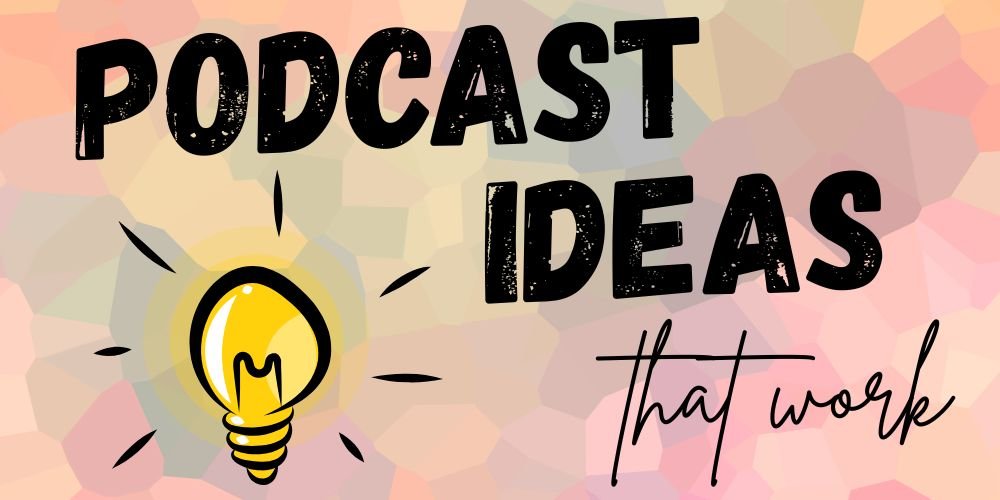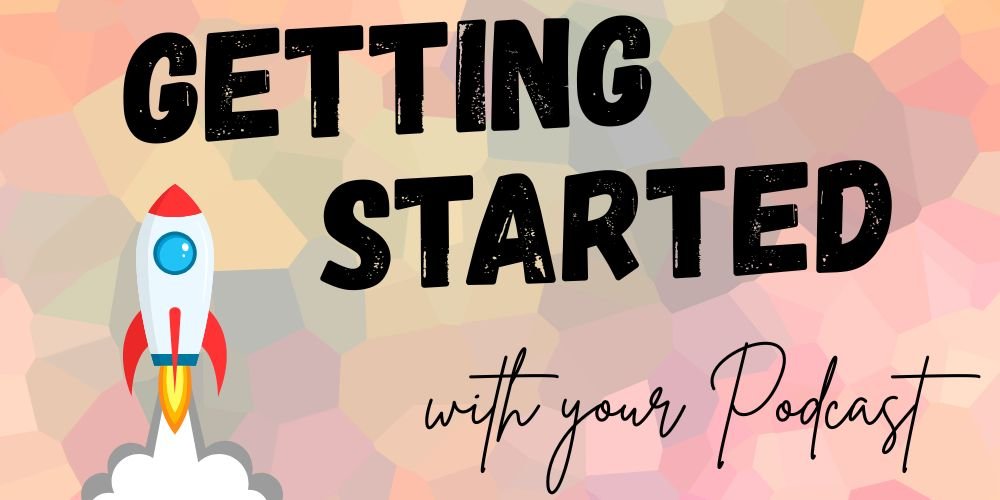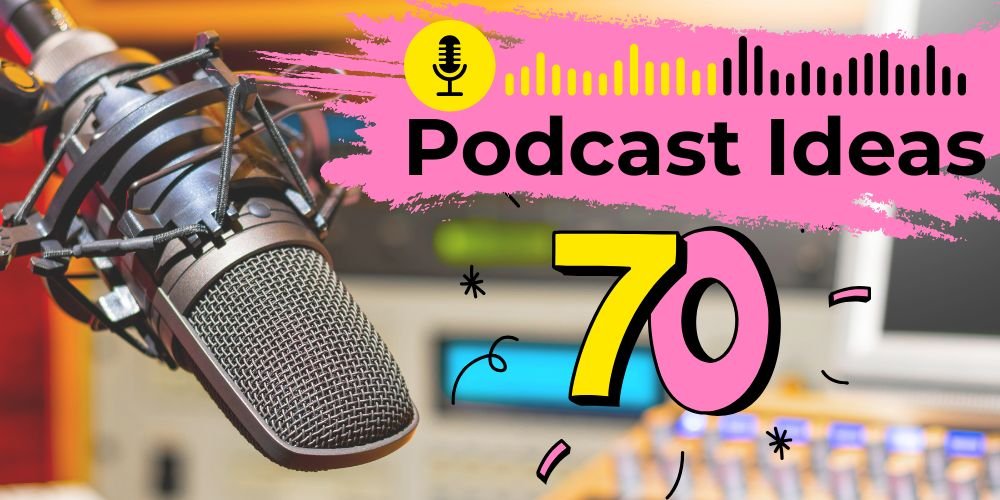Most people who want to start a podcast get stuck on the first step: choosing podcast ideas that enough listeners actually want to hear. Deciding which topic to choose is the cornerstone of your podcast. Pick something too broad, and you’re competing with thousands of identical shows. Go too narrow, and you may run out of content by episode ten.
So, you’re not alone. Finding the right podcast idea stops more aspiring podcasters than choosing the right equipment, learning podcast editing, or fear of the microphone ever will. The good news? According to Edison Research’s Infinite Dial 2025, 73% of Americans have consumed a podcast, representing over 210 million potential listeners only in the US. You don’t need a completely original idea. You need a topic you can sustain week after week, an audience that’s actively searching for it, and a format that fits your personality and style.
This guide delivers 74 podcast ideas across eight proven categories: personal development, business, pop culture, entertainment, education, finance, relationships, and career growth. Each idea includes who it serves, what makes it work in 2026, and how to approach it in a way that stands out from the competition.
Whether you have a couple of hours a week or want to build a full-time podcasting business, you’ll find multiple podcast ideas that match your schedule, interests, and goals. Let’s find your perfect podcast topic.
Table of Contents
- How to Choose Your Podcast Idea
- Personal Development & Lifestyle (11 ideas)
- Health & Wellness (9 ideas)
- Business & Entrepreneurship (10 ideas)
- Pop Culture & Entertainment (10 ideas)
- Education & Knowledge (11 ideas)
- Finance & Money (8 ideas)
- Relationships & Society (7 ideas)
- Career & Professional Growth (8 ideas)
- Getting Started with Your Podcast
- Conclusion

How to Choose Your Podcast Idea
Looking at 70+ podcast ideas can feel overwhelming until you realize you need to narrow your search first to find a topic that fits you, one you can actually sustain. Here’s how to narrow down your podcast idea search fast:
Match your interests with your knowledge
Your unfair advantage in the 2026 overcrowded podcasting scene is linking your passion with your knowledge. Passion alone won’t carry you past episode 20 when nobody’s listening yet. You also need genuine interest in the topic to fuel your podcast’s initial phase.
The sweet spot? Topics where you know more than your average listener but still feel excited to learn more. Ran a marathon? You can talk about running. Managed a remote team? You understand the chaos. Survived a career change at 35? People want that story.
Still struggling to connect your interests? Try this free AI podcast idea generator that asks you about your occupation, hobbies, and goals, then generates 5 personalized podcast ideas tailored specifically to your background. It takes only 2 minutes and often reveals angles you haven’t considered yet.
If you’re passionate but inexperienced, document the learning journey. Honest beginners often connect better than experts. They seem just a step ahead of their followers and can relate better to the problems their audience faces.
Do not overcommit with your time
Daily podcasts may sound like a good, doable idea until you’re recording, editing, and promoting every single day. Most people burn out fast.
Weekly or fortnightly episodes work for most podcasters—you have time to prepare properly and maintain quality. Monthly schedules suit deep research topics or complex production.
Don’t forget invisible work: editing takes twice as long as recording, and you also have to write show notes, promote your podcast episodes, and connect with your audience.
Test the potential of your podcast idea
Can you think of 10 episode ideas right now? If you struggle finding ideas easily, your niche might be too narrow.
Search Reddit, Facebook groups, and online forums related to your topic. Are people actively asking questions? Sharing frustrations? Seeking advice? That’s your signal there’s real demand. No conversation means no audience.
Record three test episodes
Before announcing anything, record three episodes. Don’t publish them. Just see if you enjoy the process.
Running out of things to say by episode three? Warning sign. Feels like a chore instead of something you’d do anyway? Bigger warning sign. If it feels forced now, it’ll feel worse at episode 30.
Choose your podcast idea with confidence
Regardless of how much research you do, you’ll never have all the information, so pick a topic from the list below that matches your interests, fits your schedule, and serves an audience you understand.
Then commit to at least 20 episodes before deciding if it’s working. Most podcasts fail because people quit too early, not because they picked the wrong topic. Now let’s find that topic.

Personal Development & Lifestyle Podcast Ideas
1. Mindfulness hacks for real life
Design your show like a library of quick fixes for real-life situations. Each episode addresses one specific challenge—anger cooldown, presentation anxiety, overwhelm between meetings—with a practice someone can do right then. Keep episodes under 10 minutes so listeners can actually finish them. The format turns your podcast into a tool people save and revisit.
2. Practical journaling systems that work
Focus on the time-saving systems behind bullet journaling—quick note-taking methods, weekly planning that takes 10 minutes, habit trackers people actually use. Interview guests who’ve adapted these methods for different situations: parents managing household chaos, people with attention difficulties, freelancers juggling multiple projects. Your show teaches the organizational frameworks, not the pretty page designs. Audio works perfectly for explaining these step-by-step systems.
3. The morning experiment
Follow real weekly morning routine experiments: cold showers, phone-free first hours, different wake times, and honest results. Hear from people with fascinating routines—freelancers, remote workers, new parents adapting to change. Compare popular methods like the Miracle Morning, 5 AM Club, and Artist’s Way with real-world testing.
4. Time management for busy people
Each episode tackles one specific time challenge: juggling work deadlines with personal commitments, avoiding burnout when you’re stretched thin, batching similar tasks to reduce mental switching, or setting boundaries between work and home life. Keep it practical and focused on the reality of having too much to do and not enough time.
5. The minimalist lifestyle
Explore how to be deliberate with both money and time. One episode might cover cutting subscriptions you don’t use, another examines saying no to obligations that drain your energy. Talk about choosing experiences over stuff, downsizing to a smaller home to reduce expenses, or working less by spending less and interview people who’ve made major lifestyle shifts.
6. The science of digital detox
Interview neuroscientists, addiction specialists, and sleep researchers about how screens hijack our brains—dopamine loops, attention erosion, and sleep disruption. Mix expert insights with practical strategies for reducing screen time: building phone-free habits, embracing boredom, and setting sustainable boundaries. Include occasional listener challenges or personal experiments, but keep everything grounded in science.
7. Stoicism for daily living
Connect Stoic philosophy to real-life situations people face today. Take principles from Seneca, Marcus Aurelius, and Epictetus and show how they apply to workplace stress, relationship conflicts, or financial anxiety. Keep it grounded and practical, giving listeners actionable tips in every episode.
8. Self-improvement book club
Choose a self-help or personal development book monthly and explain how to integrate its teachings into everyday routines. Discuss what’s practical, what’s overhyped, and where popular authors miss the mark. Focus on translating book concepts into real actions listeners can take. This approach taps into the huge self-help audience while offering the critical thinking most book summaries skip.
9. Productivity and goal-setting podcast
Cover different goal-setting methods, productivity strategies, and progress tracking systems. Create a space where listeners share their goals, find accountability partners, and report back on what’s working. Even a small audience with strong engagement can create real momentum for everyone involved.
10. Deep work practices
Help people reclaim their focus in distracted work environments. Each episode covers one strategy: time blocking, setting boundaries, managing digital distractions, or designing focus-friendly spaces. Address modern challenges like constant notifications, open offices, or remote work chaos, and interview people who have mastered concentration in demanding fields.
11. Creator mindset podcast
Help creators overcome the psychological barriers that stop them from shipping work. Cover specific struggles like hitting publish when it’s not perfect, pricing without undervaluing yourself, or staying motivated with few followers. Give listeners one mindset shift and one actionable step per episode.

Health & Wellness Podcast Ideas
12. Nutrition tips for busy people
Share simple, actionable nutrition tips that work for real life situations: how to eat healthy without spending too much time in the kitchen, meal batching, grocery shopping tricks, how to stay healthy while travelling, etc. Each episode is about one specific situation. Keep it practical, not preachy, with tips people can use the same day.
13. Plant-based living podcast
Follow real people transitioning to plant-based eating. Each episode tells one person’s story about what changed, what surprised them, favorite recipes, and honest challenges. Mix inspiring transformations with practical advice.
14. Sleep improvement strategies
Help people fix their sleep with proven tweaks such as consistent wake-up times, better bedroom environments or reducing blue light exposure. Mix solo episodes on one sleep topic with interviews of sleep specialists and people handling challenges like shift work.
15. Fitness myths exposed
Take on the fitness industry’s biggest lies. Does spot reduction work? Are fat-burning zones real? Which supplements actually matter? Each episode is about one popular myth, breaks down what research actually shows, and gives practical alternatives that work.
16. Beginner running podcast
Follow people training for their first 5K or 10K race: weekly training updates, common mistakes, gear advice, and motivation strategies. Document real journeys with setbacks and victories. Build a community where listeners share their progress, find running partners, and celebrate milestones together.
17. Functional medicine insights
Interview doctors and certified practitioners who explain root-cause approaches to health in plain language. Topics include understanding lab results, nutrition foundations, sleep’s role in healing, and when to investigate deeper. Use clear, evidence-based information with appropriate medical disclaimers.
18. Brain health and aging well
Make brain care accessible with simple strategies: exercise for cognitive health, social connections, stress management, or nutrition for brain function. Each episode covers one brain-healthy habit with actionable steps. Interview doctors and older adults who have maintained sharp minds.
19. Alternative therapies explained
Interview licensed medical professionals and certified practitioners who explain popular alternative therapies with evidence-based perspectives. Topics include acupuncture, cold therapy, massage, or herbal supplements. Include appropriate medical disclaimers on each episode.
20. Women’s health discussions
Create seasons around the different women life phases: menstrual health, contraception choices, fertility, pregnancy, menopause, etc. Interview other women sharing their experiences, as well as doctors and researchers. Create a warm space for honest conversations, compassion, and support.

Business & Entrepreneurship Podcast Ideas
Successful business podcasts like The Tim Ferriss Show and How I Built This prove that audiences crave authentic entrepreneurship stories and actionable advice. The key to standing out in this crowded category is finding your unique angle—whether that’s focusing on specific industries, income levels, or business challenges.
21. Solopreneur journeys
Follow solo business builders in real time with weekly progress updates: revenue numbers, tools that worked or failed, and lessons learned. Transparency is key, so show honest wins and failures in every episode. Document the real journey of building a business alone, not just the final success story.
22. Small business marketing tips
Teach one marketing tactic per episode with a practical action plan listeners can implement right away. Present real results, explain why it works, and share what to watch out for. Keep episodes focused on low-budget strategies small business owners can test without breaking the bank.
23. Remote work best practices
Help remote teams work better with practical strategies: running shorter and more efficient meetings, creating clear documentation, using async updates, and protecting focus time. Each episode covers one remote work challenge with solutions both managers and team members can implement immediately.
24. Side hustle experiments
Try one new side hustle idea each month and document the journey from validation to first dollar earned. Test different ideas like digital products, freelance services, or small local businesses. Share time invested, money spent, and honest results—what worked and what failed.
25. Building a personal brand
Guide listeners through building a personal brand, helping them define their message, create consistent content, and grow an audience on social media and email. Include actionable advice with real examples from people who’ve built successful brands.
26. Failure stories of startups
Interview founders about their failed startups: what they believed would work, warning signs they missed, money they lost, and what they’d do differently starting over. Share real lessons that help other entrepreneurs recognize red flags and avoid similar mistakes.
27. Networking in the digital age
Share actionable strategies for building genuine connections online, like the “give-first” approach, engaging with thoughtful comments, making warm introductions or collaborating on small projects. Each episode covers one networking tactic listeners can immediately use to land new opportunities.
28. Freelancer life insights
Cover the real challenges freelancers face: how to price services confidently, stop clients from adding extra work without paying more, set up efficient workflows, manage difficult clients, and advertise services effectively. Share strategies that help freelancers protect their time and earn what they’re worth.
29. Scaling from zero to profitability
Help early-stage founders move from idea to consistent revenue: finding ideal customers, positioning your offer, making your first hire, landing steady sales, and building systems that work without you. Cover the messy middle phase between starting and scaling with practical advice.
30. Making money as a content creator
Cover how writers, YouTubers, and influencers earn a living: building paid memberships, partnering with brands, licensing their content, and using AI tools to boost productivity while avoiding burnout. Share real strategies from successful content creators and insights about where the industry is heading.

Pop Culture & Entertainment Podcast Ideas
31. TV series recaps
Review popular TV shows episode by episode with spoiler warnings, standout scenes, honest reviews, and predictions for what’s next. Keep episodes fun and focused, helping viewers process what they’ve watched and catch details they missed.
32. Movie reviews (blockbusters + indie)
Review one mainstream blockbuster and one independent film each week using the same criteria: story, performances, cinematography, and rewatchability. Help listeners discover films beyond the algorithm and decide what’s worth their time.
33. Music discovery podcast
Share curated music around weekly themes like one producer, one city, or one genre. Play 5-7 tracks per episode with stories behind each selection and create shareable playlists. Help listeners discover music they wouldn’t find on their own.
34. Gaming culture talks
Cover gaming news and culture beyond reviews: speedrunning communities, game mods, accessibility features, indie gems, and industry trends. Interview game developers, professional players and content creators about what makes video gaming special.
35. Sports fandom podcasts
Create weekly rituals for sports fans: pre-game predictions, post-game reactions, highlight breakdowns, and friendly rivalry banter. Build a community where fans celebrate wins, process losses, and share the emotional rollercoaster of following their team.
36. Nostalgia (90s/2000s pop)
Revisit one pop culture artifact per episode, such as albums, TV shows, toys, video games, or internet memes, and explore origin stories, cultural impact, and whether it is still relevant today. Spark conversations about shared memories and generational experiences.
37. True crime recaps
Cover true crime cases with empathy and accuracy: verified timelines, key evidence, legal proceedings, and ongoing investigations. Avoid sensationalism and respect victims while helping listeners understand complex cases.
38. Upcoming streaming releases
Preview what’s coming to streaming services each month: new shows, movies, documentaries, and who they’re perfect for. Help listeners navigate the overwhelming number of options and find content that matches their taste.
39. Fan theories discussions
Explore popular fan theories about TV shows, movies, and books: Is the theory plausible? What evidence supports it? What holes exist? Test theories using scenes, interviews, and listener submissions. Create a space where fans debate hidden meanings and predict future plot twists.
40. Stand-up comedy stories
Explore the real world of stand-up comedy through comedian interviews: writing and testing jokes, handling tough crowds, bombing on stage, and touring life. Share funny road stories alongside honest conversations about the craft and challenges of comedy.

Education & Knowledge Podcast Ideas
41. History’s biggest mistakes
Explore history through major mistakes and their implications. Each episode examines one blunder, why smart people made it, what happened as a result, and the lessons that still apply today.
42. Science simply explained
Explain one science topic per episode like you would to a friend: no jargon, no confusing terms, just clear answers to how things work. Cover topics like black holes, vaccines, or earthquakes with comparisons anyone can understand. Add humor and stories to make complex ideas stick.
43. Philosophy for everyday life
Each episode takes the teachings of Stoicism, existentialism, and other schools, and applies them to real challenges at work, home, or in relationships. Ancient wisdom explained clearly with examples anyone can use right away.
44. Book summaries and insights
Summarize influential books for people who want the insights without spending 10 hours reading. Cover self-help bestsellers, business classics, and new releases. Extract three actionable takeaways per book, share honest critiques, and help listeners decide what’s worth reading in full.
45. Language learning diary
Pick a language and document your journey learning it from scratch. Share weekly progress updates: words learned, mistakes made, awkward conversations survived, and techniques that actually worked. Include short practice conversations with native speakers. Give listeners an honest look at what language learning really feels like.
46. Remarkable women
Tell the stories of extraordinary women: successful entrepreneurs, groundbreaking scientists, and historical figures whose contributions were forgotten. Each episode explores one woman’s journey, the obstacles she faced, and the impact she made. Celebrate women who deserve to be remembered.
47. Why the world looks this way
Uncover the stories behind the world’s geography: unusual borders drawn by war or rivers, cities that thrived because of trade routes or natural resources, and how climate shaped cultures, cuisines, and conflicts. Each episode explains why one place looks, sounds, and feels the way it does.
48. Stories behind art masterpieces
Explore famous artworks as mysteries: who commissioned them, what hidden symbols they contain, and why they shocked people at the time. Guide listeners through visual details and historical context that transforms how people see art. This podcast idea has an easy transition to video podcast, showing images of paintings, close-up details, and historical scenes.
49. Psychology explained
Uncover the hidden forces shaping your behavior. Why do we procrastinate? Why do first impressions stick? Why are some habits impossible to break? Each episode reveals one psychological principle—cognitive biases, emotional patterns, decision-making quirks—and shows how to use it in everyday life.
50. Space science
Cover space missions, discoveries, and cosmic phenomena in accessible language: what scientists learned, why it matters, and how it changes our understanding of the universe. Include tips for tracking celestial events or stargazing with apps.
51. World religions overview
Provide respectful introductions to world religions: core beliefs, key practices, holidays, and daily life for practitioners. Feature community voices sharing personal experiences. Focus on understanding differences and cultural context with curiosity rather than conflict.

Finance & Money Podcast Ideas
52. Budgeting hacks
Discover practical ways to stretch every dollar: eliminate subscription services gathering dust, negotiate better rates on insurance and utilities, buy generic products that match brand quality, wait 48 hours before non-essential purchases, shop with cash-back apps, or time major purchases around seasonal sales. Each episode teaches one specific strategy with clear steps to implement immediately.
53. Credit score secrets
Demystify credit scores with practical strategies anyone can use: what actually impacts your score, how to dispute report errors using proven scripts, when to negotiate with creditors, which tactics work versus credit repair scams to avoid, and how to rebuild credit after financial setbacks. Feature real stories of people who improved their scores by 100+ points.
54. Investing for beginners
Answer the questions beginners actually have: What’s the difference between stocks and mutual funds? How much money do I need to start? Should I invest or pay off debt first? Where do I open an account? How do I not lose everything? Build a logical series that turns investing confusion into confident action.
55. Real money diaries
Share unfiltered financial stories from real people: a teacher earning $52K managing student loans, a freelancer with irregular income budgeting month-to-month, or a couple paying off $80K in debt. Break down their income, expenses, financial decisions, and lessons learned. Help listeners see how people at different income levels actually manage money.
56. Early retirement strategies
Explore how people retire decades early: calculating how much to save monthly, choosing simple investment strategies that compound over time, reducing tax bills legally, and determining how much money you actually need to retire. Feature real people at different income levels pursuing financial independence and those who’ve already succeeded.
57. Money and couples
Talk about money in relationships: how to have the money talk, merging finances versus keeping separate accounts, splitting expenses fairly with income gaps, setting shared financial goals, handling different spending styles, and recovering from financial hiccups. Address the #1 thing couples fight about with practical frameworks.
58. Money mindset
Talk about the beliefs sabotaging financial progress: “I’m bad with money,” “I need to buy things to fit in,” or “more stuff equals more happiness.” Each episode challenges one limiting belief with psychology-backed insights and a small experiment listeners can try immediately.
59. Taxes made simple
Answer the tax questions everyone has: How do tax brackets really work? What deductions am I missing? Should I itemize or take the standard deduction? How do I lower my tax bill legally? When should I hire a professional? Make taxes understandable with practical, jargon-free guidance.

Relationships & Society Podcast Ideas
60. Dating in the digital era
Laugh through the chaos of modern dating: profile photos that looked nothing like the person, conversations that died after “hey,” dates where the chemistry just wasn’t there, and surprise connections that actually worked. Navigate dating apps, handle rejection, spot deal breakers fast, and survive awkward coffee dates with strangers.
61. Parenting stories
Share the messy reality of raising kids: toddlers melting down in grocery stores, teenagers slamming doors, bedtime taking two hours, first-day-of-school tears, and small victories nobody warns you about. Talk about one real parenting moment at a time with practical advice from people who’ve survived it.
62. Friendship in adulthood
Share the uncomfortable truth about adult friendships, how some friends disappear after starting a relationship or having babies, how maintaining friendships feels like work if you’re always the one initiating, why friend groups fracture over time, and why making new friends feels impossible. Discuss the loneliness, guilt, and confusion of navigating friendships when everyone’s busy.
63. Work relationships decoded
How do you handle a micromanaging boss? What do you do about the coworker who takes credit? How do you set boundaries with demanding colleagues? When is someone just difficult versus actually toxic? Address workplace relationship challenges including dealing with narcissistic bosses, manipulative coworkers, and everyday communication breakdowns.
64. Real marriage conversations
Discuss the stuff nobody talks about such as fights about spending habits, in-laws who overstep, months where you barely touch each other, arguments that spiral out of control, marriage after having babies and the work it takes to stay connected. Share practical tips to make it work in difficult times.
65. Communication that works
Learn one communication skill at a time: How do you actually listen instead of waiting to talk? When should you pause a heated argument? How do you ask for what you need without sounding demanding? What de-escalates tense moments? Each episode teaches one practical technique with a simple exercise to try in your next conversation.
66. Navigating life transitions
Help listeners through major changes like moving to new cities, career shifts, breakups or divorces, and starting new life chapters. Share honest stories from people who’ve survived these transitions and practical strategies for managing the chaos, loneliness, and uncertainty that comes with starting over.

Career & Professional Growth Podcast Ideas
67. Job interview strategies
How do you answer “Tell me about yourself” without rambling? How do you make any answer compelling? When should you pause to think versus rushing to fill the silence? Prepare for any interview, master behavioral questions, and discover which closing questions leave the best impression. Practice one technique per episode until interviews feel natural.
68. Job switching strategies
Recognize when it’s time to move—declining revenue, leadership churn, or gut instinct that something’s off. Conduct quiet job searches, translate your experience for different roles, handle reference requests carefully, and negotiate offers without burning bridges. Create smooth transitions that protect your reputation and set you up for success in the new role.
69. Work-life balance
Help listeners reclaim their time and energy. Cover practical strategies for protecting focused work hours, setting boundaries colleagues respect, scheduling recovery before exhaustion hits, recognizing early burnout signs, and dropping one energy-draining commitment each week. Guide your audience toward sustainable routines that prevent overwork from becoming their baseline.
70. Starting your career strong
Help new professionals make powerful first impressions in their initial months. Teach how to learn the company culture, build relationships with key people, gain visibility with leadership, and deliver early wins that prove value quickly. Address the unique challenges recent graduates face entering the workforce for the first time.
71. Mid-life career changes
Help professionals shift careers completely in their 30s and 40s. Address how to bridge existing skills to new industries, navigate identity struggles when leaving established fields, adapt to unfamiliar roles and responsibilities, and network authentically while starting over. Share successful case studies alongside the unglamorous reality of career reinvention.
72. Preventing and recovering from burnout
Help listeners recognize and address burnout before it becomes critical. Cover recovery strategies when burnout has already hit, understanding personal capacity limits, establishing routines that restore energy, having productive workload conversations with managers, and practicing quick reset techniques throughout the day.
73. Climbing the corporate ladder
Why do some people get promoted while others just as talented stay stuck? Learn how to get promoted by taking on bigger projects, getting noticed by your results, finding out who’s really fighting for you behind closed doors, and choosing between going into management or not.
74. Essential leadership skills
Help new and aspiring managers build fundamental leadership skills one at a time. Explore how to give constructive feedback that creates change, communicate decisions that align teams, run skip-level meetings effectively, and handle conflict before it becomes toxic. Share real examples from leaders across different industries.
Haven’t Found Your Perfect Idea Yet?
You just read through 74 podcast ideas across 8 categories. If none of them feel quite right, don’t worry. That’s completely normal. The best podcast ideas often come from combining your unique interests, work experience, and personal hobbies in ways generic lists can’t predict. That’s where personalization makes all the difference.
Get 5 custom podcast ideas tailored specifically to you: Try this free AI podcast idea generator that creates personalized podcast concepts.
The tool works best when you answer the optional questions. The more specific you are, the more personalized your results become. Many users discover their perfect podcast idea by seeing how their seemingly unrelated interests can combine into something unique. Once you have your idea, come back here to learn how to get started.

Getting Started with Your Podcast
You’ve chosen your podcast idea. Now it’s time to turn this idea into action:
Basic podcast equipment: Don’t overinvest at the start. You’ll need a decent USB microphone, a pair of headphones, and a few other essentials. If you’re looking for the best options under $200, check out this complete equipment guide.
Naming your podcast: Once you’ve chosen your idea and ordered equipment, you’ll need a memorable, brandable name. If you need help brainstorming, try this free AI podcast name generator to pull up creative ideas instantly.
Recording your first episodes: Find the quietest room in your house. Soft surfaces like curtains, carpets, and couches absorb sound and reduce echo. Record a 2-minute test clip, listen back with headphones, and adjust your distance from the microphone. Speak naturally as if you’re talking to one friend, not performing for thousands. Keep a glass of water nearby—dry mouth happens fast when recording.
Editing basics: Cut obvious mistakes, long pauses, and excessive filler words (“um,” “uh,” “like”). Don’t obsess over perfection. Listeners forgive minor audio flaws if your content delivers value. Your first episodes will sound rough—that’s completely normal. You’ll improve with each recording. Stick with free software like Audacity or GarageBand at first. Compare podcast editing software alternatives to find the right fit for your needs.
Distribution and publishing: Upload your finished episodes to a podcast hosting platform like Podbean, Buzzsprout, RedCircle or Spotify for Podcasters. These services automatically distribute your show to Spotify, Apple Podcasts, and other directories. Most offer free plans perfect for beginners. Hit publish, share your episodes, and stay consistent with your schedule. Be patient—building an audience takes time.
Conclusion
Starting a podcast in 2026 doesn’t require the perfect podcast idea or expensive equipment. It requires choosing a topic you can sustain, committing to consistency, and accepting that growth takes time.
Pick one idea from this guide. Record three test episodes. If it feels right, commit to 20 episodes before deciding whether to continue. Most podcasts fail because creators quit too early, not because their idea was wrong.
Ready to launch? Try our free podcast tools to name your show, generate episode titles, and stand out from day one.

